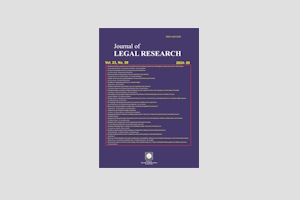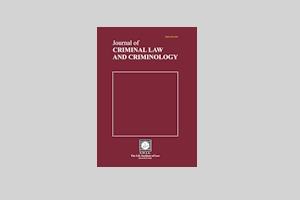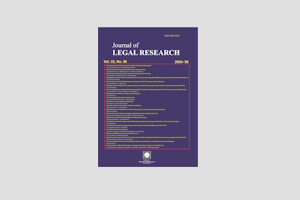Journal of
Criminal Law and Criminology
Number 8
Vol. IV ● No. 2
Autumn 2016 – Winter 2017
Managing Editor: Vahid Eshtiagh
Editor-in-Chief: Mohammad Ashoori
CONTENTS
Articles
International Responsibility Arising from the Breach of the Obligation to Extradite or Prosecute in the light of the International Court of Justice in the case of Belgium against Senegal
Dr. Mohammad Hossein Ramazani Ghavamabadi
Background and Basis of the Constitution of the Judicial Police in Iran’s Legal System
Dr. Hasanali Moazzenzadegan & Mohammad Faraji
The Process and Opposed to Detention Warrant in Iran with an Emphasis on the French Legal System
Dr. Gholam Hassan Kooshki
Terrorism: A Social-Moral Syndrome or a Political Means
Dr. Nasrin Mehra & Dr. Nourooz Kargari
Anticompetitive Procedures Crime or Offence? (Explanation of a New Approach in Criminal System of Iran)
Dr. Seyed Hossein Hosseini & Zahra Ahmadi
Overlap in Crime behavior (Case Study: Computer False Publishing and Computer related Defamation)
Dr. Hasan Aalipour & Elham Khorasani
Articles
International Responsibility Arising from the Breach of the Obligation to Extradite or Prosecute in the light of the International Court of Justice in the case of Belgium against Senegal
Dr. Mohammad Hossein Ramazani Ghavamabadi
Associate Professor, Faculty of Law-Shahid Beheshti University
Abstract:
The obligation to extradite or prosecute is a one of the most important issue of cooperation and mutual legal assistance. The main goal of the exercise of this commitment is the fight against impunity. Various conventions any prosecute or extradition has recognized this commitment with priority. In any case, what matters is combat the most serious crimes of concern is the international community as a whole. In order to fulfill the obligation to extradite or prosecute, the government obliged to take all appropriate measures, including legislation for the trial, the prosecution and investigation and referred the case to the courts of law are committed. Breach of this obligation will lead to international responsibility.
This study attempts to explain the breach of the obligation to extradite or prosecute in the light of the Convention against Torture in the framework of the International Court of Justice is the rate in 2012.
Keywords: Extradition, International Responsibility, Costume, Jus Cogens, Tort.
Background and Basis of the Constitution of the Judicial Police in Iran’s Legal System
Dr. Hasanali Moazzenzadegan
Associate Professor at Faculty of Law and Political Sciences of Allameh Tabataba’i University
&
Mohammad Faraji
Doctorate Student at Faculty of Law and Political Sciences of Allameh Tabataba’i University
Abstract:
The importance of crime detection and police investigation, on the one hand, derives from the necessity of protecting individual right and on the other hand, from the effective function of the police in order to protect social security. In spite of the specialized police division in some country, it has not been followed by criminal procedure law of Iran. After all, new enacted criminal procedure law, particularly article 30, somehow meets its criteria. In terms of establishing judicial police, regarding some certain criteria necessary for it, is intended. The fifth economic, social and cultural development program law of Islamic Republic of Iran provided its establishment; the judicial police establishment bill sent to parliament by judicial branch but the bill consider judicial police under the supervision of judicial branch and does not refer to the criteria. The criteria necessary for establishing judicial police, which are being specialized and under authorization of judicial authorities with organizationally establishing in the executive branch, would be discussed precisely in this article.
Keywords: Judicial Police, Administrative Police, Special Permit of Judicial Police, Organization of Judicial Police, Executive Branch.
The Process and Opposed to Detention Warrant in Iran with an Emphasis on the French Legal System
Dr. Gholam Hassan Kooshki
Assistant Professor in Criminal Law and Criminology, Allame Tabatabaʼi University, Tehran, Iran
Abstract:
One of the functions of criminal procedure is support of the rights and individual freedom. In some situations, restrictive actions such as detention to keep public order and detect a crime is inevitable. This action is against the principle of the innocence and therefore must be used as a last resort. To achieve mentioned purpose and also fair justice, on the one hand at this essay will be emphasized that detention warrant must be issued only by a “neutral, detached and independent” judge and also detention being adversarial proceeding and making distinguish between investigatory authority and judicial judge will be emphasized. On the other hand, detained person at necessary situations in the legal manners must object to the detention before an independent authority. According to comparison studies, judicial authority must be considered the objection as soon as possible in the adversarial proceeding and in presence of detained person. It is noted that this process must be hold in the multiple judges system and obtained a suitable decision. It is obvious that the use of comparison studies in the both of fields could assist us in seeking fair model for the proceeding of issuance and objection to detention warrant as the most serious action against individual right before issuing certain verdict.
Keywords: Detention, Objection, Issuance a Warrant, Investigation Proceeding, Criminal Procedure Law.
Terrorism: A Social-Moral Syndrome or a Political Means
Dr. Nasrin Mehra
Member of the Scientific Board of Shahid Beheshti University
&
Dr. Nourooz Kargari
Member of the Scientific Board of Science and Research University
Abstract:
Terrorism or terrorist activities is a modern phenomena which has caused the most social and political upheavals both internally and internationally. This phenomenon has also been used by the super powers as an excuse for armed conflicts in the form of wars. From this point of view, terrorism is an economic, social and cultural syndrome against which some kind of reaction is a must. Another approach towards terrorism is regarding it as political means inter alia with other means that can be used by the political powers and groups for achieving their goals. Both viewpoints have been considered in the present article so that the nature of terrorism as a syndrome or as means to an end may be clarified.
Keywords: Terrorism, Violence, Terrorist Groups, Psychology of Terrorists.
Anticompetitive Procedures Crime or Offence? (Explanation of a New Approach in Criminal System of Iran)
Dr. Seyed Hossein Hosseini
Assistant Professor Department of Law Faculty of Economics and Business Administration,
Ferdowsi University Of Mashhad
&
Zahra Ahmadi
Doctor of criminal law and criminology of Tehran University
Abstract:
The category of competitive law is a new category which has recently been entered the Iranian criminal policy that has brought about new norms called anticompetitive procedures. Such procedures include recent prohibitions for the individuals in the economic activities. Noticing the methods for conforming the norms to the anticompetitive procedures and investigating its nature state a new approach adopted by Iranian legislatures. Such an approach is considered as offence establishing leading to the alteration of the traditional concept of offence and formulating a new meaning for this term. Offence in its new sense may include very significant and central issues. The more the offences enhance, the more the rules and regulations against such offences develop. The effective principles and factors in adopting such policies are in variety. However, the most fundamental policies root in criminal law studies such as the minimal criminal law, criminal inflation, international law data, offence considerations, and resorting to judicial authorities.
Keywords: Competitive Law, Criminal Inflation, Offence, Offence Establishing.
Overlap in Crime behavior (Case Study: Computer False Publishing and Computer related Defamation)
Dr. Hasan Aalipour
Assistant professor of Tehran University College of Farabi
&
Elham Khorasani
Student Master of Criminal Law and Criminology, Islamic Azad University, Science and Research Branch, Yazd
Abstract:
The main principle to resolve the overlap in criminal titles against committing a behavior is intellectual diversity. Intellectual diversity against committing a single behavior applies for violation of two or several values supported by legal provisions cited in different regulation. In some cases, although, one behavior causes an overlap for the titles on which intellectual diversity is not applied? Particularly, the 2013 Islamic Penal Code, Art 134, Clause 2, has arranged an exception for the diversity principles that addresses a probability in which apparently more than one misdemeanor occurs in some cases, while this is not regarded as a diversity
This article is intended to examine above-mentioned challenge with the issue of cyber publishing false and computer related defamation as its case study. This is concluded that an intellectual diversity shall not be enforced due solely to a single behavior which has given rise to more than one criminal title; especially where both titles are aligned, but one is specific and the other general wherein the specific criminal title is chosen.
Keywords: Single Behavior, Multiple Titles, Multiplicity of Crime, Intellectual Diversity, Specific Criminal, Cyber False Publishing and Computer Related Defamation.





